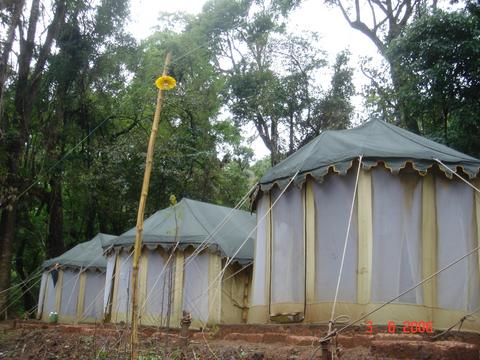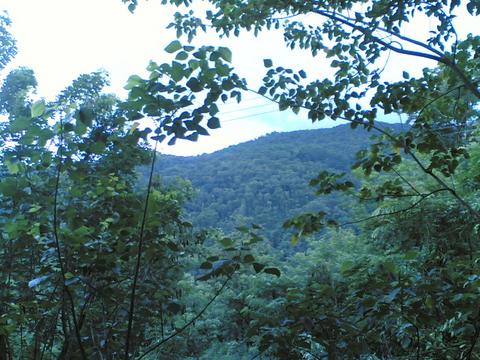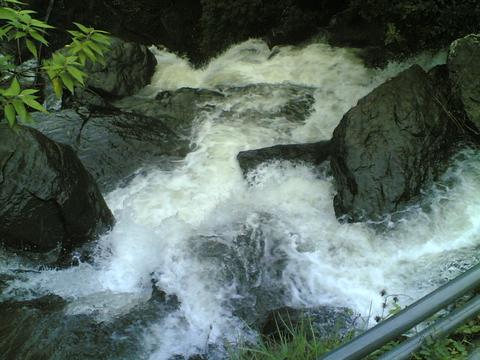Kirudale - as I later got to know - literally means 'a tiny hamlet' and is indeed one of the smallest villages in Coorg (Kodagu). Being less frequented - most tourists head to Madikeri, the district headquarter - Kirudale is also perhaps lesser known. That, I thought, was a blessing. For, Madikeri is on its way to become another Ooty or Kodaikanal. In terms of hotel occupancy and revenue earned, that might be good news. But for travellers like me who want to explore silence and solitude, the very thought of a favourite coffee plantation haunt of a great many people can act as a deterrent.
|
Our route from Mysore took us past the boulder-like hillocks of Ramnagaram. The town's claim to fame is that blockbuster Sholay was shot on these hills. Hillocks which may have been Gabbar and his men's den soon gave way to river banks and as we approached Coorg, the view outside was predominantly rain-drenched bamboo trees. We stopped over at Kushalnagar - primarily to buy gumboots. Heading as we were to tropical rainforests, gumboots were mandatory. With India's second largest Tibetan settlement, Bylakuppe, next door, Kushalnagar was bustling with activity. Buddhist monks of the Vajrayana sect could be spotted everywhere - in the marketplace, on the way to monasteries, on bikes. Shops and wayside cafes had pictures of His Holiness Dalai Lama in various sizes and one petrol pump even had a picture of the Father of the Nation placed along side that of the Dalai Lama. Shopping done, we were ready for our journey uphill.
 In an hour-and-a-half we were on the winding hill roads leading to Kirudale. The roads seemed like mid-parting lines of coffee plantations. The temperature had fallen considerably and the evening mist, settled on treetops, indicated that we had reached our destination. A mild drizzle welcomed us at the Rainbow House, as our host Alex Noronha greeted us at the Planter's Camp.
In an hour-and-a-half we were on the winding hill roads leading to Kirudale. The roads seemed like mid-parting lines of coffee plantations. The temperature had fallen considerably and the evening mist, settled on treetops, indicated that we had reached our destination. A mild drizzle welcomed us at the Rainbow House, as our host Alex Noronha greeted us at the Planter's Camp.
The motorable road had to end at the colonial Rainbow House and it was time to take a not so long walk through slopes, natural stairs, a ladder-like bridge, narrow walkways and paths to our respective tents.
Planter's Camp is an eco adventure camp, located in 10 acres of unspoiled forest land surrounded by coffee, pepper and citric fruit plantations. The Camp's Swiss tents with attached bathrooms are equipped to accommodate 15 guests at a time. The Rainbow House serves as a dining hall as well as a meeting or workshop area. What struck at the very outset was the rustic beauty of the place. No manicured gardens, no bar-b-que trolley, no uniformed staff - just untamed and untouched nature, a friendly host, his small but efficient team and yes, delicious home-cooked meals. Alex had stories and interesting trivia on almost everything around. Post a sumptuous dinner it was time to listen to his escapades of encountering a wild boar and no not around a bonfire (bonfires are a strict no-no here), but with glow worms and stars lighting up the darkness of the forest. It was like a story-telling session in the middle of nowhere, with only an occasional mobile phone call breaching the stillness. Despite being far from the madding crowds, the camp has good mobile phone connectivity.
 Next morning, the whistling schoolboy's calls acted as alarm clocks and we were all up unusually early. It was time to go for a walk through the forest to the waterfall. With Alex as our guide, we set out on our nature trail. An early morning sun trying to fit into the gaps between trees; leaves fluttering in dance-like movements; sounds of birds that are unheard of in cities, the tingle of cool breeze, tall teak trees guarding the mountains - we saw all these and more. Tasting citric fruits, smelling pepper, getting tips on coffee plantations, spotting a chameleon here and a scorpion there, posing for photo in front of a mountain spring and listening to the gurgling sound of water falling, we comfortably trekked to the waterfall. Paddy fields overlook the waterfall. We rested near the fields watching the white foams ferociously tumble upon brown and black rocks.
Next morning, the whistling schoolboy's calls acted as alarm clocks and we were all up unusually early. It was time to go for a walk through the forest to the waterfall. With Alex as our guide, we set out on our nature trail. An early morning sun trying to fit into the gaps between trees; leaves fluttering in dance-like movements; sounds of birds that are unheard of in cities, the tingle of cool breeze, tall teak trees guarding the mountains - we saw all these and more. Tasting citric fruits, smelling pepper, getting tips on coffee plantations, spotting a chameleon here and a scorpion there, posing for photo in front of a mountain spring and listening to the gurgling sound of water falling, we comfortably trekked to the waterfall. Paddy fields overlook the waterfall. We rested near the fields watching the white foams ferociously tumble upon brown and black rocks.
The drizzle became harder as we trekked back to Rainbow House where a well-laid breakfast was waiting for us. The camp is somewhat strict about meal timings. With a cook who can put many a trained chefs to shame, preparing traditional Kodagu delicacies for us, we were always early for our meals.
 Afternoon was not a time for slumber; instead we were off to the river on Alex's open jeep. A bumpy ride and rains lashing us all over made us scream and screech with both joy and fright. In contrast, the river was calm and flowing quietly - as if oblivious of its surrounding. As a rain-washed evening sky made way for a bright canopy of stars, the tranquility of the river echoed all around.
Afternoon was not a time for slumber; instead we were off to the river on Alex's open jeep. A bumpy ride and rains lashing us all over made us scream and screech with both joy and fright. In contrast, the river was calm and flowing quietly - as if oblivious of its surrounding. As a rain-washed evening sky made way for a bright canopy of stars, the tranquility of the river echoed all around.
Next morning it was time to get back to the grind of the city. I bid adieu to the sacred groves of Kirudale with a promise to myself of coming back for a longer stay. As our vehicles moved to the town downhill, Kirudale and Planter's Camp seemed to vanish away - as if melting in the mist. I would like them to stay that way - not exposed, instead waiting to be explored by those who are not looking for a mere tourist destination but a place where they can touch, smell and feel raw nature, with of course, some basic home-like comforts but sans frills and embellishments.
Factfile:
Coorg or Kodagu is the south-western district of Karnataka bordering Kerala. It is situated on the western mountainous region of South India and has an area of 4,102.3 sq. km. Madikeri, the district headquarter is around 25 km from Kirudale. The nearest airports are Mangalore (135 km) and Bangalore (260 km). The nearest railheads are at Mysore (130 km) and Hassan (146 kilometers). Planter's Camp is in Kirudale in Madapur, Somwarpet (north Coorg).
 It took us some time to painstakingly squeeze out of the narrow roads of Bangalore. Once we were out of the din and bustle of the IT city, it was time to enjoy the green expanse of the countryside - coconut trees lined up in rows, paddy fields separated by lotus ponds, quaint villages on the outskirts of small towns. If the green outside soothed the eyes, the tickling raindrops served as coolants and an amicable weather made the 300-kilometre-journey comfortable. We were on our way to Kirudale in north Coorg.
It took us some time to painstakingly squeeze out of the narrow roads of Bangalore. Once we were out of the din and bustle of the IT city, it was time to enjoy the green expanse of the countryside - coconut trees lined up in rows, paddy fields separated by lotus ponds, quaint villages on the outskirts of small towns. If the green outside soothed the eyes, the tickling raindrops served as coolants and an amicable weather made the 300-kilometre-journey comfortable. We were on our way to Kirudale in north Coorg.

 In an hour-and-a-half we were on the winding hill roads leading to Kirudale. The roads seemed like mid-parting lines of coffee plantations. The temperature had fallen considerably and the evening mist, settled on treetops, indicated that we had reached our destination. A mild drizzle welcomed us at the Rainbow House, as our host Alex Noronha greeted us at the Planter's Camp.
In an hour-and-a-half we were on the winding hill roads leading to Kirudale. The roads seemed like mid-parting lines of coffee plantations. The temperature had fallen considerably and the evening mist, settled on treetops, indicated that we had reached our destination. A mild drizzle welcomed us at the Rainbow House, as our host Alex Noronha greeted us at the Planter's Camp.
 Next morning, the whistling schoolboy's calls acted as alarm clocks and we were all up unusually early. It was time to go for a walk through the forest to the waterfall. With Alex as our guide, we set out on our nature trail. An early morning sun trying to fit into the gaps between trees; leaves fluttering in dance-like movements; sounds of birds that are unheard of in cities, the tingle of cool breeze, tall teak trees guarding the mountains - we saw all these and more. Tasting citric fruits, smelling pepper, getting tips on coffee plantations, spotting a chameleon here and a scorpion there, posing for photo in front of a mountain spring and listening to the gurgling sound of water falling, we comfortably trekked to the waterfall. Paddy fields overlook the waterfall. We rested near the fields watching the white foams ferociously tumble upon brown and black rocks.
Next morning, the whistling schoolboy's calls acted as alarm clocks and we were all up unusually early. It was time to go for a walk through the forest to the waterfall. With Alex as our guide, we set out on our nature trail. An early morning sun trying to fit into the gaps between trees; leaves fluttering in dance-like movements; sounds of birds that are unheard of in cities, the tingle of cool breeze, tall teak trees guarding the mountains - we saw all these and more. Tasting citric fruits, smelling pepper, getting tips on coffee plantations, spotting a chameleon here and a scorpion there, posing for photo in front of a mountain spring and listening to the gurgling sound of water falling, we comfortably trekked to the waterfall. Paddy fields overlook the waterfall. We rested near the fields watching the white foams ferociously tumble upon brown and black rocks. Afternoon was not a time for slumber; instead we were off to the river on Alex's open jeep. A bumpy ride and rains lashing us all over made us scream and screech with both joy and fright. In contrast, the river was calm and flowing quietly - as if oblivious of its surrounding. As a rain-washed evening sky made way for a bright canopy of stars, the tranquility of the river echoed all around.
Afternoon was not a time for slumber; instead we were off to the river on Alex's open jeep. A bumpy ride and rains lashing us all over made us scream and screech with both joy and fright. In contrast, the river was calm and flowing quietly - as if oblivious of its surrounding. As a rain-washed evening sky made way for a bright canopy of stars, the tranquility of the river echoed all around.